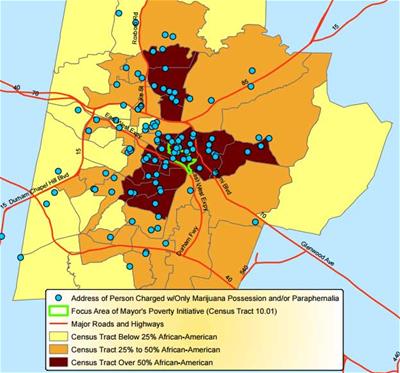Our report shows that large racial disparities persist in Durham’s enforcement of low-level marijuana violations, and these actions come at a high cost to those charged and the entire community.
For years, Self-Help Credit Union and its partners have been investing in Durham neighborhoods to revitalize struggling communities and build greater economic opportunities. We appreciate and depend upon the vital and complementary role that the Durham Police Department (DPD) plays in public safety. However, to the extent that law enforcement practices are unfair or inefficient, these practices directly undermine millions of dollars in investments and thwart progress that would benefit the entire city.
Our report shows that large racial disparities persist in Durham’s enforcement of low-level marijuana violations, and these actions come at a high cost to those charged and the entire community. Here are our major findings:
 Disparities by Neighborhood: Durham Marijuana Charges Displayed by Residential Addresses (Feb. 2015 – Aug. 2015)
Disparities by Neighborhood: Durham Marijuana Charges Displayed by Residential Addresses (Feb. 2015 – Aug. 2015)
-
In Durham, African Americans continue to comprise over 80% of the people charged for misdemeanor marijuana violations, while whites remain a small fraction of those charged.
-
African Americans age 25 and under represent about 15% of Durham’s population, yet this group represents 46% of misdemeanor marijuana charges.
-
Only 12% of misdemeanor marijuana charges are triggered by a citizen complaint. The overwhelming majority are actions initiated by the DPD.
-
A simple misdemeanor conviction costs families up to $374 in court fees and fines. The costs in lost opportunities for education and employment can be much higher, and are grossly disproportionate to the infractions.
-
Some of the neighborhoods with the highest level of enforcement are the same neighborhoods where Self-Help Credit Union and others are investing as part of a Durham program to fight poverty and help increase opportunities for residents.
We encourage the Durham City Council to make misdemeanor marijuana violations the lowest priority for local law enforcement, as recommended by the FADE (Fostering Alternatives to Drug Enforcement) coalition. In this report, we present simple, practical policy recommendations for handling marijuana misdemeanors and supporting community investments in Durham.